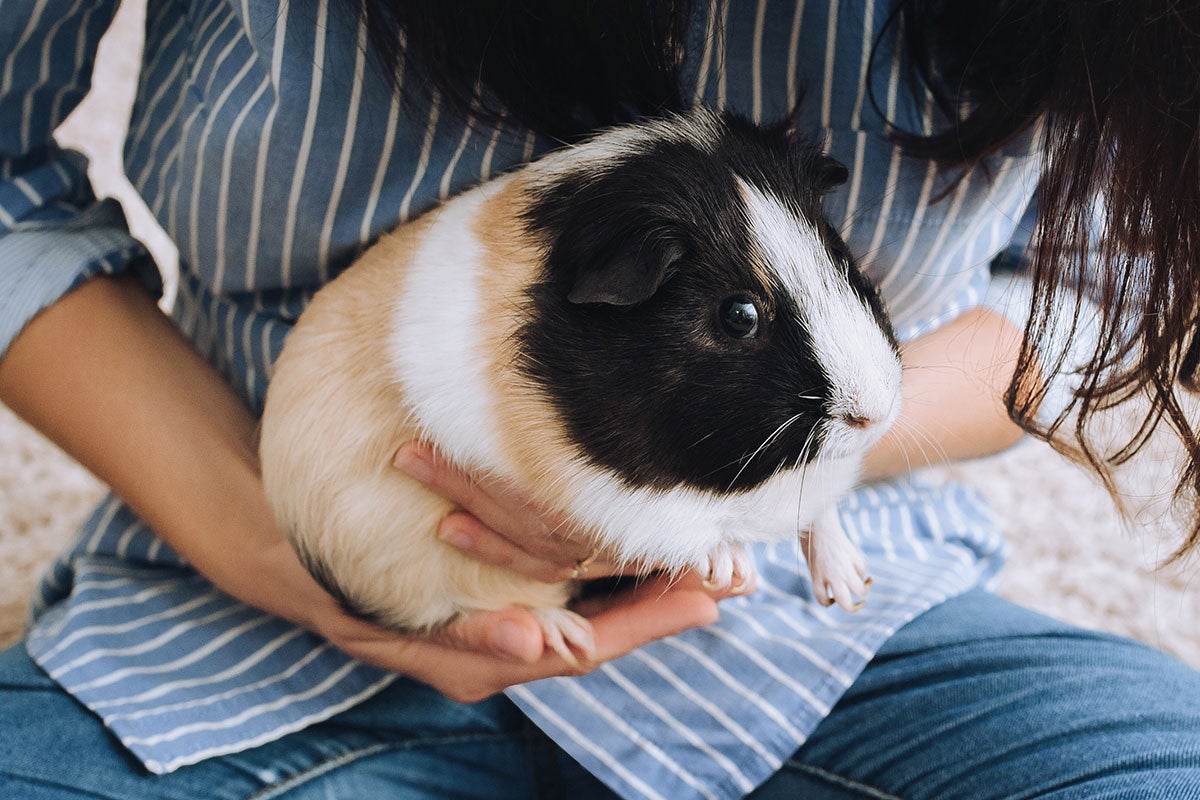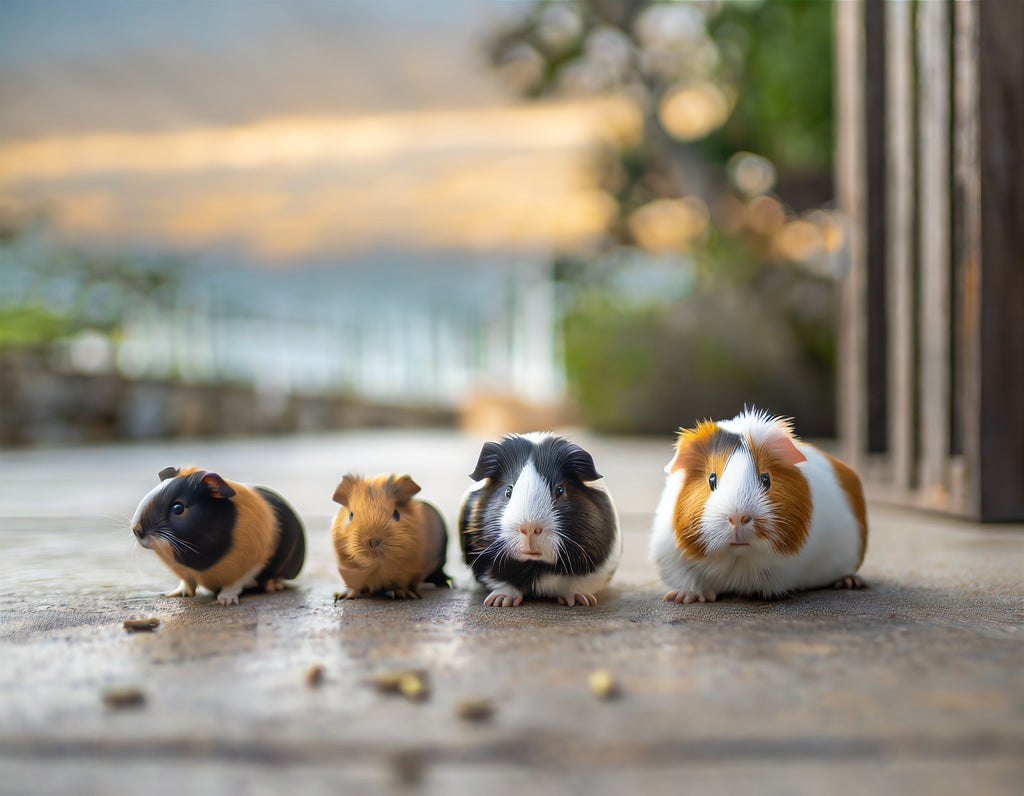Guinea pigs typically live for about 5 to 7 years, but some can live up to 8 years. These small rodents make wonderful pets due to their friendly nature and easy care requirements.
As a potential guinea pig owner, understanding their lifespan is crucial for providing the necessary care and commitment. By knowing what to expect in terms of lifespan, you can ensure a happy and healthy life for your furry companion. Let’s delve deeper into the factors that influence the lifespan of guinea pigs and how you can optimize their well-being for a longer and more fulfilling life together.

Credit: www.humanesociety.org
Contents
- Introduction To Guinea Pig Longevity
- Dietary Foundations For A Healthy Life
- The Importance Of Regular Exercise
- Routine Health Checks And Preventive Care
- The Role Of Genetics In Lifespan
- Creating A Stress-free Environment
- The Benefits Of Companionship
- Advanced Care Tips For Senior Guinea Pigs
- Frequently Asked Questions
- Conclusion
Introduction To Guinea Pig Longevity
Guinea pigs, also known as cavies, are popular pets known for their friendly and gentle nature. As a potential pet owner, understanding the lifespan of guinea pigs is essential for providing the best care and ensuring their well-being. In this blog post, we will explore the factors that contribute to the longevity of guinea pigs, including their average lifespan and the key factors that can affect it.
The Average Lifespan
Guinea pigs have an average lifespan of four to six years. However, with proper care and attention, some guinea pigs may live up to eight years or even longer. It’s important to note that the lifespan of a guinea pig can vary based on several factors, including genetics, diet, environment, and overall health.
Factors Affecting Lifespan
Several factors can influence the lifespan of a guinea pig. These include diet, exercise, genetics, environment, and healthcare. Ensuring that your guinea pig receives a balanced diet, regular exercise, and proper veterinary care can significantly impact their longevity. Additionally, providing a clean and stress-free environment is crucial for promoting a healthy and happy life for your guinea pig.
Dietary Foundations For A Healthy Life
Guinea pigs are delightful pets known for their friendly nature and adorable squeaks. Providing them with the right diet is essential for ensuring a long and healthy life. Let’s explore the dietary foundations for a healthy guinea pig life, including the optimal foods for guinea pigs and foods to avoid.
Optimal Foods For Guinea Pigs
Guinea pigs require a diet rich in hay, vegetables, and pellets to thrive. Here are the optimal foods for ensuring their nutritional needs are met:
- High-quality grass hay, such as Timothy, orchard grass, or meadow hay
- Fresh vegetables such as bell peppers, cucumbers, and leafy greens like romaine lettuce and kale
- Small amounts of fruits, such as apples and strawberries, as occasional treats
- High-quality guinea pig pellets fortified with vitamin C
Foods To Avoid
While certain foods are beneficial for guinea pigs, others should be avoided to prevent health issues. Here are some foods that should be kept away from your guinea pig:
- Chocolate and other sweets, which can be toxic to guinea pigs
- Foods high in sugar or fat, such as candy and potato chips
- Onions and garlic, as they can cause digestive problems
- Seeds and nuts, which can pose a choking hazard
The Importance Of Regular Exercise
Guinea pigs are active little creatures that require regular exercise to maintain their physical and mental well-being. Providing opportunities for exercise is essential to prevent obesity, promote healthy growth, and reduce the risk of health problems. Additionally, regular exercise helps to prevent boredom and encourages natural behaviors, leading to a happier and more content pet.
Creating A Stimulating Environment
Guinea pigs thrive in an environment that offers plenty of opportunities for exercise and exploration. Creating a stimulating living space with tunnels, hideaways, and platforms encourages physical activity and mental stimulation. Introducing toys and objects for them to investigate and play with can keep them engaged and active throughout the day.
Rotating the layout of their living area and providing new enrichment regularly can prevent boredom and encourage movement. This can include rearranging tunnels and objects, or introducing new toys and activities to keep them engaged.
Safe Exercise Activities
When it comes to exercise, ensuring that the activities are safe is paramount. Guinea pigs should have access to a secure, enclosed space where they can roam and explore without the risk of injury or escape. Providing a safe exercise wheel specifically designed for guinea pigs can offer them a chance to run and stay active, but it’s important to ensure that the wheel is appropriately sized and safe for their use.
Furthermore, allowing supervised floor time in a secure, guinea pig-proofed area can provide them with the opportunity to stretch their legs and explore their surroundings. Setting up obstacle courses using safe and appropriate materials can also encourage physical activity and mental engagement.
Routine Health Checks And Preventive Care
Ensure your guinea pig’s long lifespan with routine health checks and preventive care to maintain their well-being. Regular veterinary visits and a balanced diet are key for promoting a healthy and happy life for your furry companion.
Guinea pigs are adorable and social animals that make great pets for people of all ages. As an owner, it’s your responsibility to ensure that your guinea pig is healthy and happy. One way to achieve this is by scheduling routine health checks and preventive care.Scheduling Veterinary Visits
Regular check-ups with a veterinarian are essential to ensure that your guinea pig stays healthy. It’s recommended to schedule a visit every six months. During the check-up, the vet will perform a physical exam, check your pet’s weight, and evaluate their overall health. They will also provide you with advice on how to care for your guinea pig and prevent any potential health issues.Common Health Issues And Prevention
Guinea pigs are prone to certain health issues, including dental problems, respiratory infections, and skin conditions. To prevent these issues, you should provide your guinea pig with a balanced diet, clean living space, and plenty of exercise. Regularly trimming their nails and grooming their fur can also help prevent skin conditions.| Common Health Issues | Prevention Tips |
|---|---|
| Dental problems | Provide a balanced diet that includes hay and fresh vegetables |
| Respiratory infections | Keep their living space clean and well-ventilated |
| Skin conditions | Regularly groom your guinea pig and provide a clean living space |
The Role Of Genetics In Lifespan
Understanding the role of genetics in a guinea pig’s lifespan is crucial for responsible pet ownership.
Inherited Traits
Genetics play a significant role in determining a guinea pig’s lifespan.
Choosing A Healthy Guinea Pig
Ensure good genetics by selecting a guinea pig from a reputable breeder.

Credit: supremepetfoods.com
Creating A Stress-free Environment
Guinea pigs have an average lifespan of 5-7 years, but creating a stress-free environment can significantly impact their well-being and longevity.
The Impact Of Stress
- Stress can lead to health issues in guinea pigs.
- Reduced lifespan due to chronic stress.
- Behavioral changes like aggression or withdrawal.
Tips For Reducing Stress
- Provide a spacious and clean living area.
- Maintain a consistent routine for feeding and playtime.
- Offer a balanced diet rich in hay and vegetables.
- Ensure proper socialization with other guinea pigs.
- Minimize loud noises and sudden movements near their habitat.
The Benefits Of Companionship
Extend your guinea pig’s lifespan with the benefits of companionship, promoting mental stimulation and overall well-being. Social interaction helps increase longevity and happiness in these adorable pets.
Guinea pigs are social animals and thrive in the company of other guinea pigs. Companionship not only provides them with a sense of security and comfort but also has many other benefits for their physical and mental well-being. In this article, we will discuss the social needs of guinea pigs and how introducing new companions can be beneficial for them.Social Needs Of Guinea Pigs
Guinea pigs are highly social animals and require daily interaction with other guinea pigs to remain happy and healthy. They communicate with each other using a variety of sounds, body language, and scents. They also groom each other, which helps to strengthen their bond and maintain hygiene.When guinea pigs are kept alone, they can become depressed, stressed, and anxious. They may also develop behavior problems such as biting, chewing, and self-mutilation. Therefore, it is important to provide them with companionship to fulfill their social needs.Introducing New Companions
Introducing new companions to your guinea pig can be a tricky process, but it is essential for their well-being. Guinea pigs are territorial animals, and they may need some time to adjust to a new companion. It is crucial to introduce them in a neutral territory, such as a playpen or a room they have never been in before. This will help to reduce the risk of fighting and establish a new hierarchy.It is also important to introduce guinea pigs of the same sex, as opposite-sex pairings can lead to unwanted pregnancies. However, if you want to have a mixed-sex group, ensure that the males are neutered to prevent breeding.In conclusion, companionship is essential for the well-being of guinea pigs. It not only fulfills their social needs but also provides them with a sense of security and comfort. If you are planning to keep guinea pigs as pets, it is important to provide them with companionship to ensure their physical and mental health.
Credit: andy.pet
Advanced Care Tips For Senior Guinea Pigs
To ensure a long lifespan for senior guinea pigs, it’s essential to provide them with a balanced diet, plenty of exercise, and regular check-ups with a veterinarian. Additionally, creating a comfortable and stress-free living environment can contribute to their overall well-being.
As your guinea pig ages, it is important to adjust their care to ensure they remain happy and healthy. In this section, we will discuss some advanced care tips for senior guinea pigs. This includes adjusting their diet, exercise routine, and environment to meet their changing needs. Additionally, we will cover how to spot signs of aging and address any health concerns that may arise.Adjusting Care With Age
As your guinea pig ages, their nutritional needs will change. It’s important to adjust their diet accordingly to prevent any health issues. Senior guinea pigs require a diet that is lower in fat and higher in fiber to maintain a healthy digestive system. Fresh hay, leafy greens, and limited amounts of pellets are ideal for senior guinea pigs. You should also provide them with fresh water daily.In addition to their diet, you should adjust their exercise routine to match their energy levels. Senior guinea pigs may not be as active as younger guinea pigs, so it’s important to provide them with plenty of space to move around and explore at their own pace. Consider creating a designated play area for your senior guinea pig with soft, comfortable bedding and safe toys to prevent injury.Spotting Signs Of Aging
As your guinea pig ages, they may experience changes in their behavior and health. It’s important to monitor your senior guinea pig closely for any signs of aging, such as decreased activity levels, weight loss, or changes in their appetite. You should also check their teeth and nails regularly to ensure they are healthy and not overgrown. If you notice any changes in your guinea pig’s behavior or health, it’s important to consult with a veterinarian as soon as possible.In conclusion, providing advanced care for senior guinea pigs involves adjusting their diet, exercise routine, and environment to meet their changing needs. It’s important to monitor your guinea pig closely for any signs of aging and address any health concerns that may arise. By providing your senior guinea pig with the proper care, you can help them live a happy and healthy life for years to come.Frequently Asked Questions
How Long Do Guinea Pigs Live?
Guinea pigs typically live for around 5 to 7 years, although some can live up to 8 years with proper care and nutrition. Providing a balanced diet, regular veterinary check-ups, and a comfortable living environment can help maximize their lifespan.
What Factors Can Affect A Guinea Pig’s Lifespan?
Several factors can influence a guinea pig’s lifespan. These include genetics, diet, exercise, stress levels, living conditions, and overall healthcare. Maintaining a healthy lifestyle, offering a balanced diet, providing mental stimulation, and reducing stress can contribute to a longer lifespan for your furry friend.
How Can I Ensure A Long And Healthy Life For My Guinea Pig?
To ensure a long and healthy life for your guinea pig, it is essential to provide a nutritious diet consisting of fresh hay, vegetables, and pellets. Regular exercise, social interaction, and mental stimulation are also crucial. Schedule regular veterinary check-ups and keep their living environment clean and comfortable to promote their well-being.
What Are Some Common Health Issues That Guinea Pigs Face?
Guinea pigs are susceptible to various health issues, including dental problems, respiratory infections, skin conditions, and digestive disorders. It is important to monitor their eating habits, keep their living area clean, and seek prompt veterinary care if you notice any signs of illness or discomfort.
Conclusion
Understanding the lifespan of a guinea pig is crucial for responsible pet ownership. With an average lifespan of 5-7 years, it is important to provide them with proper care and attention throughout their lives. By providing a balanced diet, a safe environment, regular veterinary check-ups, and social interaction, you can help ensure a long and healthy life for your beloved guinea pig.
Remember, their well-being depends on you!



